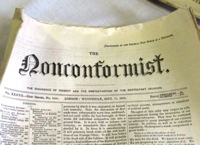Difference between revisions of "Nonconformist"
(Created page with 'File:lighterstill.jpgright|frame *[http://en.wikipedia.org/wiki/17th_century 1619] ==Definitions== *1often capitalized : a person who does not...') |
m (Text replacement - "http://" to "https://") |
||
| (One intermediate revision by one other user not shown) | |||
| Line 1: | Line 1: | ||
[[File:lighterstill.jpg]][[File:Nonconformist.jpg|right|frame]] | [[File:lighterstill.jpg]][[File:Nonconformist.jpg|right|frame]] | ||
| − | *[ | + | *[https://en.wikipedia.org/wiki/17th_century 1619] |
==Definitions== | ==Definitions== | ||
| − | *1often capitalized : a [[person]] who does not [[conform]] to an [[established]] church; especially : one who does not conform to the [ | + | *1often capitalized : a [[person]] who does not [[conform]] to an [[established]] church; especially : one who does not conform to the [https://en.wikipedia.org/wiki/Church_of_England Church of England] |
*2: a [[person]] who does not [[conform]] to a generally [[accepted]] [[pattern]] of [[thought]] or [[action]]. | *2: a [[person]] who does not [[conform]] to a generally [[accepted]] [[pattern]] of [[thought]] or [[action]]. | ||
==Description== | ==Description== | ||
| − | '''Nonconformity''' (usually capitalized) is the refusal to "[[conform]]" to, or follow, the [[governance]] and usages of the [ | + | '''Nonconformity''' (usually capitalized) is the refusal to "[[conform]]" to, or follow, the [[governance]] and usages of the [https://en.wikipedia.org/wiki/Church_of_England Church of England] by the Protestant Christians of England and Wales. |
==Origins and use== | ==Origins and use== | ||
| − | In England, after the [ | + | In England, after the [https://en.wikipedia.org/wiki/Act_of_Uniformity_1662 Act of Uniformity 1662] a '''Nonconformist''' was an [[English]] subject belonging to a non-Christian religion or any non-Anglican church. A [[person]] who also advocated religious [[liberty]] may also be more narrowly considered as such. [https://en.wikipedia.org/wiki/English_Dissenters English Dissenters] (such as [https://en.wikipedia.org/wiki/Puritans Puritans] and [https://en.wikipedia.org/wiki/Presbyterians Presbyterians]) who violated the [https://en.wikipedia.org/wiki/Act_of_Uniformity_1559 Act of Uniformity 1559] may retrospectively be considered Nonconformists, typically by practising or advocating [[radical]], sometimes separatist, [[dissent]] with respect to the [https://en.wikipedia.org/wiki/Established_Church Established Church]. |
| − | Presbyterians, [ | + | Presbyterians, [https://en.wikipedia.org/wiki/Congregational_church Congregationalists], [https://en.wikipedia.org/wiki/Baptists Baptists], [https://en.wikipedia.org/wiki/Religious_Society_of_Friends Quakers] (founded in 1648), and those less organized were considered Nonconformists at the time of the 1662 Act of Uniformity. Later, as other groups formed, they were also considered Nonconformists. These included [https://en.wikipedia.org/wiki/Methodists Methodists], [https://en.wikipedia.org/wiki/Unitarianism Unitarians], and members of the [https://en.wikipedia.org/wiki/Salvation_Army Salvation Army]. |
The religious census of 1851 revealed that total Nonconformist attendance was very close to that of Anglicans. | The religious census of 1851 revealed that total Nonconformist attendance was very close to that of Anglicans. | ||
==See also== | ==See also== | ||
| − | *'''''[ | + | *'''''[https://en.wikipedia.org/wiki/Counterculture Counterculture]''''' |
[[Category: Political Science]] | [[Category: Political Science]] | ||
[[Category: Religion]] | [[Category: Religion]] | ||
Latest revision as of 01:24, 13 December 2020
Definitions
- 1often capitalized : a person who does not conform to an established church; especially : one who does not conform to the Church of England
- 2: a person who does not conform to a generally accepted pattern of thought or action.
Description
Nonconformity (usually capitalized) is the refusal to "conform" to, or follow, the governance and usages of the Church of England by the Protestant Christians of England and Wales.
Origins and use
In England, after the Act of Uniformity 1662 a Nonconformist was an English subject belonging to a non-Christian religion or any non-Anglican church. A person who also advocated religious liberty may also be more narrowly considered as such. English Dissenters (such as Puritans and Presbyterians) who violated the Act of Uniformity 1559 may retrospectively be considered Nonconformists, typically by practising or advocating radical, sometimes separatist, dissent with respect to the Established Church.
Presbyterians, Congregationalists, Baptists, Quakers (founded in 1648), and those less organized were considered Nonconformists at the time of the 1662 Act of Uniformity. Later, as other groups formed, they were also considered Nonconformists. These included Methodists, Unitarians, and members of the Salvation Army.
The religious census of 1851 revealed that total Nonconformist attendance was very close to that of Anglicans.
